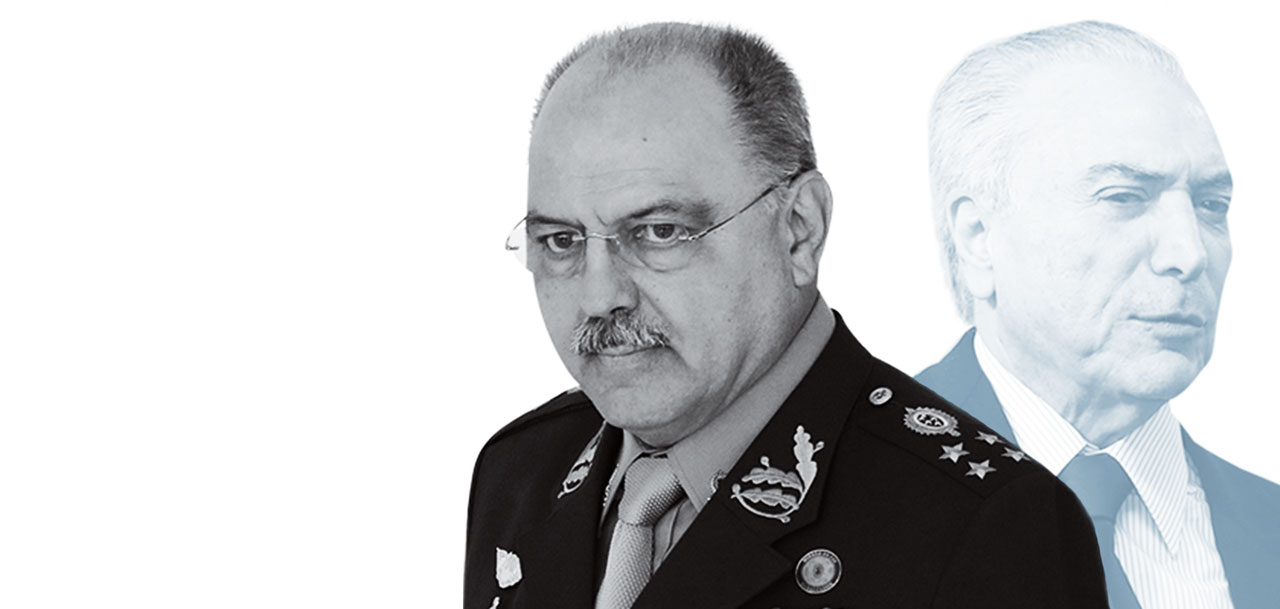In February 2017, ousted President Dilma Rousseff warned of a second, more radical and more repressive phase of the Coup d’état which removed her from office – akin to the “Institutional Acts” in the years following the Military Coup of 1964. General Sérgio Westphalen Etchegoyen, architect of the 2018 Federal Military Intervention in Rio de Janeiro, personally oversaw security arrangements at the Planalto palace during Rousseff’s suspension, at some points denying her access to transport or visitors. In June 2017, Temer Government officials inadvertently revealed the identity of Duayne Norman, head of the CIA in Brasilia, through a meeting scheduled with Etchegoyen which was accidentally made public.
In February 2018, Brasil’s most conservative Congress since the 64-85 dictatorship voted to approve Michel Temer’s decree for intervention – effectively martial law in the state of RJ – by 340 votes to 72, as head of the Armed Forces, General Vilas Boas, urged that the Military should be allowed to do as it will during the intervention without “risk” of a new “Truth Commission”, such as that which investigated kidnapping, murder, rape and torture under the US-supported dictatorship, including that of Dilma Rousseff herself. Despite national and some international media coverage suggesting otherwise, statistics and expert analysis do not support the existence of any exceptional wave of violence used to justify the Rio intervention.
Here, we present a translation of veteran journalist Bob Fernandes, who in his regular commentary for Gazeta TV, talked about the family history of Etchegoyen, now one of the most powerful in Brasil, and his role in its current situation.
By Bob Fernandes.
General Sérgio Etchegoyen is the President’s Cabinet Chief of Institutional Security, the GSI, and through the Brazilian Intelligence Agency (Agencia Brasileira da Intellegencia/ABIN) is director of the Brazilian Intelligence System, (Sistema Brasileira da Intellegencia/SISBIN). SISBIN has its tentacles in 37 institutions, including the armed forces, the federal police, the military police, the government’s legal team, etc.
Etchegoyen is more than Temer’s strong man. Temer is a weak president and Etchegoyen comes from a century long family tradition in the Army. Army Chief of Staff in the Temer reserves, Etchegoyen is the architect of military intervention in Rio de Janeiro. Power does not allow a vacuum.
Etchegoyen’s grandfather, Lieutenant Alcides, was one of the men who tried to prevent Washington Luiz from assuming the presidency in 1926.
In August, 1954, Alcides signed the manifesto calling for Getulio Vargas’ resignation. Alcides was the father of Leo Etchegoyen: general and father of current minister Sergio Etchegoyen.
Leo Etchegoyen worked to bring down president Joao Goulart in the 1964 coup. He was secretary of security in Rio Grande de Sul state in 1965. A few years later he was an advisor to Dictator Garrastazu Medici. In 2014, Sérgio Etchegoven, called the Truth Commission “pathetic and frivolous”, in the name of family and in defence of his father’s memory. The Commission found Leo Etchegoyen responsible for human rights violations during the dictatorship.
Governor Pezão, testifying under investigation, inherited Rio de Janeiro from Sérgio Cabral, the former governor who is now condemned to 87 years in jail. The voices and the spokesmen knew who Cabral was and what he was doing. They remained silent to not interfere with the billion dollar business negotiations of the World Cup and Olympics.
47% of the Rio de Janeiro electorate abstained or annulled their votes in the last mayoral election. They refused to vote for either the evangelical bishop-mayor Crivella or Marcelo Freixo. This says a lot about so many of the involved parties.
Now, a government surrounded by innumerable corruption accusations creates a military intervention to… fight organized crime. One more scam with the veneer of legality. An Interventionist General, troops and tanks sent into communities which lack, precisely, the presence of the state and its services.
We will call this Institutional Act II. Institutional Act I was the work of Eduardo Cunha, who was arrested and imprisoned only after finishing his dirty work of the impeachment.
Nothing surprises me any more. In the Folha de Sao Paulo, Daniela Lima says that Judge Moro will be nominated as Man of the Year in New York. 7 Banks are sponsoring the awards ceremony and tables at the event cost $26,000. One of the tables has been bought by Petrobras. The same Petrobras that is under investigation by Judge Moro in Operation Lava Jato.
[qpp]

